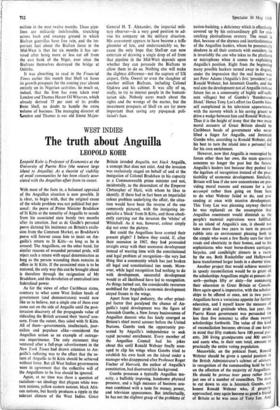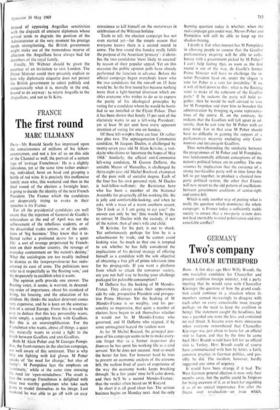The truth about Anguilla
WEST INDIES LEOPOLD KOMI
Leopold Kohr is Professor of Economics at the University of Puerto Rico (the nearest large island to Anguilla). As a theorist of viability of small communities he has been closely asso- ciated with the Anguillan affair from its outset.
With most of the facts in, a balanced appraisal of the Anguillan situation is now possible. It is clear, to begin with, that the original cause of the whole problem was not political but per- sonal: the peeve of Prime Minister Bradshaw of St Kitts at the temerity of Anguilla to secede from his associated state barely two months after its creation. Just as de Gaulle's personal peeve dictated his insistence on Britain's exclu- sion from the Common Market, so Bradshaw's peeve will forever cause him to insist on An- guilla's return to St Kitts—as long as he is around. The Anguillans, on the other hand, for similar reasons of wounded personal pride, will reject such a return with equal determination as long as the person wounding them remains in office in St Kitts. If the associated state is to be restored, the only way this can be brought about is therefore through the resignation of Mr Bradshaw, and the devolution of centralised into federalised power.
As for the views of other Caribbean states, contrary to what some West Indian heads of government (and demonstrators) would now like us to believe, not a single one of them ever came out on the side of Anguilla until the post- invasion discovery of the propaganda value of ridiculing the British aroused their `moral' con- cern. From the outset, they sided with St Kitts. All of them—governments, intellectuals, jour- nalists and populace alike—considered the Anguillan action as an example of outrage- ous impertinence. The only statement they ventured after a full-page advertisement in the New York Times had drawn attention to An- guilla's suffering was to the effect that the re- turn of Anguilla to St Kitts should be achieved without force. But all West Indian governments were in agreement that the collective will of the Anguillans to be free should be ignored.
Again, at no time was there a question of racialism—an ideology that plagues white wes- tern nations, yellow eastern nations, black Afri- can nations, but barely produces a ripple in the tolerant climate of the West Indies. Great Britain invaded Anguilla, not black Anguilla, a concept that does not exist. And the invasion was exclusively staged on behalf of and at the instigation of Colonel Bradshaw in his capacity as a Commonwealth prime minister and not, incidentally, as the descendant of the Emperor Christopher of Haiti, with whom he likes to identify. If there had in fact been an imperialist colour problem underlying the affair, the situa- tion would have been the reverse of the one commonly pictured, with the instigating im- perialist a `black' from St Kitts, and those obedi- ently carrying out the invasion the 'whites' of Whitehall. As it was, however, colour simply did not enter the picture.
But could the Anguillans have averted their present plight? I believe they could, if, after their secession in 1967, they had proceeded straight away with their economic development instead of wasting time with the constitutional and legal problem of recognition—the very last thing that a community which has just broken all legal and constitutional ties needs. More- over, while legal recognition had nothing to do with development, successful development would in all likelihood have led to recognition. As things turned out, the considerable resources mobilised for Anguilla's economic development stayed frozen in the wings.
Apart from legal pedantry, the other princi- pal factor that paralysed the chance of An- guilla's rapid development was the figure of Jeremiah Gumbs, a New Jersey businessman of Anguillan descent who has lately emerged as Britain's chief moral accuser before the United Nations. Gumbs took the opportunity pre- sented by Anguilla's independence to seek rapid personal enrichment. Every member of the Anguillan Council had his jokes about this until Ronald Webster finally man- aged to clip his wings when Gumbs tried to establish his own bank on the island under a manager who disappeared after Professor Roger Fischer of Harvard, the author of Anguilla's constitution, had discovered his background.
Gumbs possesses a typically Anguillan ten- acity, a bullishly imposing, handsome physical presence, and a high measure of business acu- men combined with a taste for money, power, and television appearances. But intellectually, he has not the slightest grasp of the problems of nation-building, a deficiency which is effectively covered up by his extraordinary gift for ear. catching platitudinous oratory. The result is that, because of the shyness and inarticulateness of the Anguillan leaders, whom he possesshely shadows in all their contacts with outsiders, he is invariably the one who takes to the platform or microphone when it comes to explaining Anguilla's position. Right from the beginning many possible backers turned away in disgust, under the impression that the real leader was not Peter Adams (Anguilla's first 'president') or Ronald Webster, but Jeremiah Gumbs, and the real aim the development not of Anguilla (whose future lies as a community of highly self-suffi- cent villages) but of Gumbs's 'Rendezvous Hotel.' Hence Tony Lee's effort (as Gumbs him- self complained in his television appearances, with the naivety which is his saving grace) to drive a wedge between him and Ronald Webster. Thus it is the height of irony that the two main moral accusers of Great Britain should be Caribbean heads of government who never lifted a finger for Anguilla, and Jeremiah Gumbs who, according to Ronald Webster, did his best to turn the island into a personal fief for his own enrichment.
However, now that Anguilla is reoccupied by forces other than her own, the main question concerns no longer the past but the future. Anguilla's leaders lost because they pushed for the legalism of recognition instead of the prac- ticability of economic development. Similarly, Britain will lose if she now concentrates on pro- viding moral reasons and excuses for a fait accompli rather than going on from here to do what Webster failed to do, and pro- ceeding at once with massive development. This Tony Lee was planning anyway (before he was• replaced) on the assumption that Anguillan resentment would diminish as the people's material aspirations were fulfilled. In an island of Anguilla's size, it should not take more than two years to turn its present rubble into an environment pleasing both to the simple who want a few flashy cars for their roads and electricity in their homes, and to the sophisticates who want horse-drawn carriages, bicycles, and candlelight dinners in a rustic by the sea. Both Rockefeller and Hollywood have transformed larger lands in a shorter time.
Another project that would achieve wonders in speedy reconciliation would be to grant all the scholarships Anguillans might at present ab- sorb—perhaps fifty or sixty—for continuing their education in Great Britain or Canada. Here again speed is imperative, with the scholar- ships to be offered at once, not in two years. Anguillans have a voracious appetite for further education, and I myself know the measure of their pride and gratitude when, last year, the Puerto Rican government was persuaded (in less than five minutes) to offer them twenty scholarships forthwith. The value of this kind of reconciliation becomes obvious if one keeps in mind that fifty students have 100 proud par- ents, 200 living grandparents and 800 uncles and aunts who, in their sum total, amount to practically the entire voting population. Meanwhile, on the pohtical front, Ronald Webster should be given a special position in the British Administrator's cabinet of advisers in recognition of the commanding hold he has on the affection of the majority of Anguillans. He should be prtmus inter
pares rather than just one of a number of councillors. The man to cut down to size is Jeremiah Gumbs, not honest Ronald Webster who, if properly approached, may again become as good a friend of Britain as he was once of Tony Lee. And instead of appeasing Anguillan sensitivities with the dispatch of eminent diplomats whose arrival tends to degrade the position of the Administrator at the very moment his prestige needs strengthening, the British government might make use of the tremendous reserve of affection the Anguillans have always had for members of the royal family.
Finally, Mr Webster should be given the courtesy of an invitation to visit London. The Prime Minister could then privately explain to him why diplomatic etiquette does not permit the British government to admit publicly and unequivocally what it is, morally in the end, bound to do anyway: to return Anguilla to the Anguillans, and not to St Kitts.



































 Previous page
Previous page